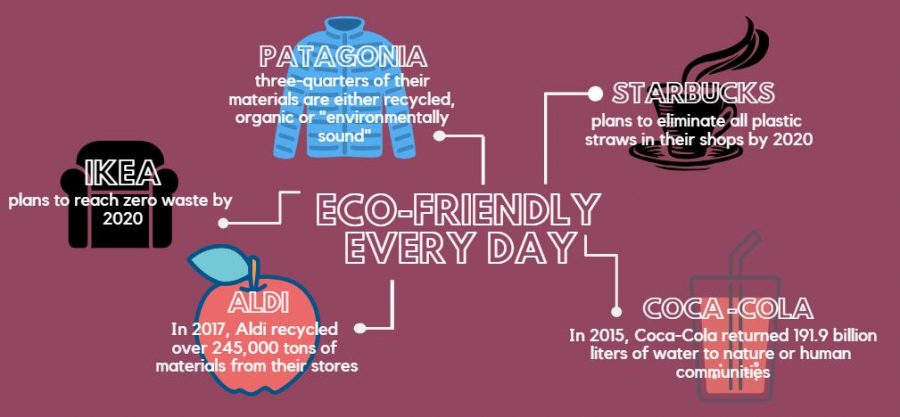Companies combat climate change
sources: Aldi, The Washington Post, Forbes and CNN
March 25, 2019
In recent years, environmental awareness has grown on a global scale, especially among younger generations, demonstrated through protests against climate change and rallies for the conservation of the natural world. This increase in consciousness of the planet has not only been backed by some of the population, but by several environmentally friendly companies as well. Through small steps, these eco-friendly companies, including Aldi and Coca-Cola, are aiding the ongoing battle against climate change.
“With companies having as much power as they do today, it’s really important that corporations are environmentally aware because ultimately, it’s corporations and manufacturing agencies that create so much pollution, use up so much petroleum, products and plastics that really damage the environment,” senior Grady Jones said.
Many of the world’s most well known companies have acknowledged the power that they hold in influencing the actions of the majority of the population. Toward the end of 2018, Ben & Jerry’s announced their plan to eliminate the use of single-use plastic straws and spoons in their shops by 2019, an initiative that has become common in many other food-related businesses.
“I know a lot of health food chains have taken advantage of [the] of idea of being environmentally friendly,” Jones said. “Cava now uses biodegradable straws, plastics and utensils.”
Reevaluating how big of an impact they have on their consumers, many of the world’s top brands have seemed to already changed their mindsets; made evident by developments such as TerraCycle’s new project, Loop, which will be launched this spring. An online shopping platform that has partnered with popular businesses like Haagen-Dazs, Dove and Crest, Loop is essentially a delivery system that provides consumers with reusable, rather than just recyclable, product packaging and that takes the used packaging back to companies right from one’s house to be thoroughly cleaned for reuse.
“We often talk about the three R’s of recycling, but there’s actually a fourth R and the first one is rethink; rethink what we use before buying,” AP Environmental Science teacher Anne Fenton said. “Being sustainable means that you’re thinking before you make something, like how to make it better with less waste, because again, you either dig it up or you grows it. At some point we dig up everything; we have to get smart about how we’re going to make items.”
With the continuous rise of global temperatures, average surface temperatures heating up to 1.62 degrees Fahrenheit above pre-industrial levels according to NASA, and increase in carbon dioxide levels in the atmosphere, the earth needs the help of its inhabitants to reverse all the damage done to it.
“The planet is interconnected with humans and our practices; we must find a balance between our needs for energy and the toll it takes on the environment. Climate change is not what the weather is doing outside today or tomorrow; it is decades of trends that we see on a larger scale,” biology teacher Michele Gates said. “Learn, read and act. The youth can make a difference, but the choice has to be their own.”


